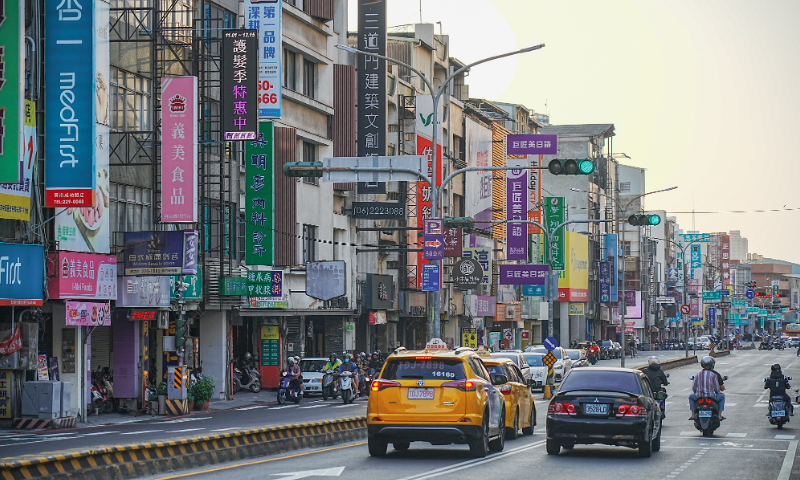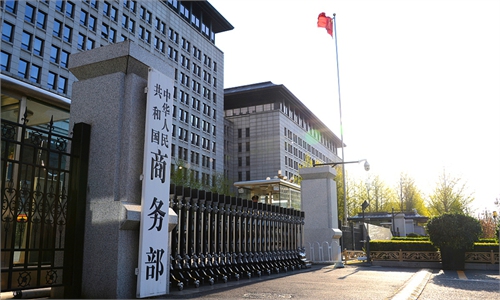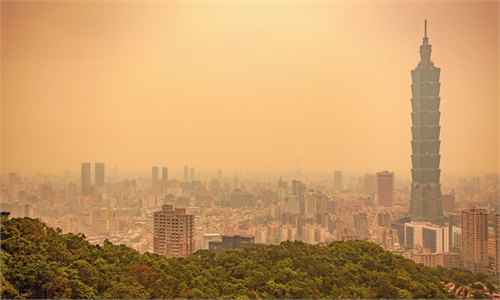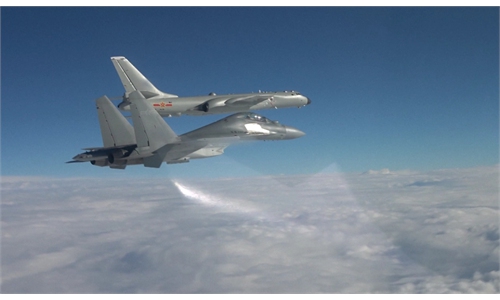The DPP exerts 'green terror' on the grassroots of Taiwan: Global Times editorial

The photo taken on November 26, 2023 shows street scenes in Taiwan island. Photo: VCG
A group of 41 neighborhood chiefs from Taipei are facing investigation by the Democratic Progressive Party (DPP) authorities of Taiwan island for traveling to the Chinese mainland. They are accused of violating the "anti-infiltration act" and other charges, creating an atmosphere of political oppression within Taiwan. Nearly four years after Tsai Ing-wen forcefully enacted the "anti-infiltration act," this draconian law, as anticipated, is revealing its ominous implications by targeting the longstanding cross-Straits exchanges that have been in progress for over 30 years.
While the DPP struggles with economic and livelihood issues, it excels in political maneuvering. By targeting the neighborhood chiefs, the DPP has brought the atmosphere of "green terror" down to the grassroots level of Taiwan society. The provisions of the so-called "anti-infiltration act" are vague, with no clear indication of the corresponding enforcement agency. However, the penalties are quite explicit, allowing arbitrary decisions by administrative agencies to transfer individuals for legal action. These characteristics are ideal for the DPP authorities to fabricate charges and suppress dissent.
It used to be common for neighborhood chiefs from Taiwan to come to the mainland for tourism or exchanges, but this time, the intention of the DPP seizing upon this as an excuse to attack the Kuomintang couldn't be more evident, which is for electoral gains. The DPP's various dirty political tactics are well known to the people on the island. However, their political attacks on the nearly 10 million cross-Straits personnel exchanges annually are among the most dissatisfying and egregious actions for the Taiwan people.
The Taiwan Affairs Office of the State Council revealed on December 19 that in recent times, they have received multiple reports from people in various sectors in Taiwan, saying that they have been questioned, intimidated and obstructed by the DPP authorities and relevant agencies over normal exchanges or their visits to the mainland. Some have even been investigated under fabricated charges. In fact, during the DPP's governance, this phenomenon is quite common, and it fluctuates with the political cycles of the island, indicating that it is intentionally orchestrated by the DPP. Under the harassment and suppression of the DPP, personnel exchanges and off-line interactions between people from both sides of the Taiwan Straits have been severely obstructed.
Some media outlets in Taiwan bluntly state that Taiwan claims to be free, but when it comes to any activities involving the mainland, there is no freedom. This makes the DPP authorities' rhetoric of "protecting democracy and freedom" appear even more hypocritical. Take a look at what they have been doing in the island in recent years. They seized every opportunity to create a chilling and oppressive atmosphere, attempting to extinguish the people's desire for interactions with the mainland. On one hand, they maliciously attack and suppress the movements of their own people, and on the other hand, they offer to countries such as the US and Japan the accumulated wealth of the Taiwan society as "tributes," acting based on the opinions of outsiders. It truly portrays a vivid picture of "unfilial descendants."
The cross-Straits people-to-people exchanges and interactions have been ongoing for more than 30 years, greatly contributing to the affection and mutual benefits for people on both side of the Straits, which is welcomed by both, forming an unstoppable trend. It is not only the most solid foundation of cross-Straits relations but also a powerful guarantee for cross-Straits peace. Blocking or interrupting this trend through crude and simple methods is impossible and won't be accepted by the people in Taiwan. The DPP authorities' purpose is clear - to sabotage grassroots exchanges between the two sides, severing one of the strongest practical ties between them and creating conditions for "Taiwan independence," which is extremely perilous.
The "anti-infiltration act" is a major covert move played by the DPP. From the DPP's initiation of this bill to its forced passage and subsequent implementation on the Taiwan residents, there has been a continuous strong voice of skepticism within the island regarding it. Some netizens in Taiwan have metaphorically referred to it as the "restoration of Dongchang," a secret agency during the Ming Dynasty (1368-1644). The meaning of it is evident. The consequences of this law align with the initial warnings from many people, creating widespread apprehension in cross-Straits people-to-people exchanges. It restricts the free will of Taiwan compatriots and deprives them of the legitimate right to engage in cross-Straits communication.
A significant number of voices within the island criticize the DPP for bringing Taiwan back to the "martial law" period. Taiwan residents who still remember that period of "white terror" may find that the current "green terror" in certain aspects surpasses the previous one. The DPP spares no effort in provoking cross-Straits confrontation, inciting "anti-mainland" and "fear-mainland" sentiments, and dividing internal ethnic groups in Taiwan. Why are they so afraid of grassroots exchanges between the two sides of the Straits? The answer to this question holds many important insights.



